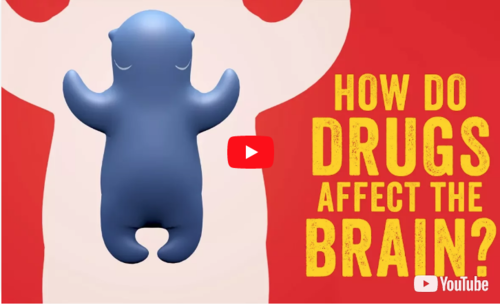How spontaneous brain activity keeps you alive - Nathan S. Jacobs
The wheels in your brain are constantly turning, even when you're asleep or not paying attention. In fact, most of your brain’s activities are ones you’d never be aware of … unless they suddenly stopped. Nathan S. Jacobs takes us inside the always active, surprisingly spontaneous brain.
Old adults grow just as many new brain cells as young people!
Neuroplasticity (see: https://www.perthbraincentre.com.au/) is the ability of the brain to change its own structure and function as a result of what happens to us, and what we do and what we think. Some have said that the discovery that the brain is not therefore “hard-wired” and can change is the most important advancement in science in over 400 years.
Nature Play for Children
There is good evidence indicating that children are not spending enough time outdoors. There has been a dramatic shift over the past 30 years, affecting children in particular and “green places” have been replaced with “screen spaces.” The move indoors with a sharp increase in screen time is having a significant impact on children’s physical and mental health. Most of the children we see in clinic with problems like ADHD and Anxiety are spending too much time sitting indoors on screens and when they are just encouraged to simply get outside often start to feel better.
How do drugs affect the brain? - Sara Garofalo
Most people will take a pill, receive an injection, or otherwise take some kind of medicine during their lives. But most of us don’t know anything about how these substances actually work. How can various compounds impact the way we physically feel, think, and even behave? Sara Garofalo explains how some drugs can alter the communication between cells in the brain.
Light it up blue! - World Autism Awareness
What is Autism Spectrum Disorder?
Autism Spectrum Disorder (ASD) is a persistent neuro-developmental disorder that affects how a person communicates, relates to other people, and how they experience the world around them. Often symptoms of ASD develop gradually, and parents will usually notice signs by around 2 yrs of age, when it becomes apparent they are not meeting their developmental milestones.1 Sometimes though, the symptoms can be subtle and may not be obvious until school age or even later in life. In Australia, around 1% of the population has ASD1 with males being 4 times more likely to be diagnosed than females. The cause of Autism is not clearly understood but it appears to be a complex interaction of both genetic and environmental factors.3
How the food you eat affects your brain - Mia Nacamulli
When it comes to what you bite, chew and swallow, your choices have a direct and long-lasting effect on the most powerful organ in your body: your brain. So which foods cause you to feel so tired after lunch? Or so restless at night? Mia Nacamulli takes you into the brain to find out.
How sugar affects the brain - Nicole Avena
When you eat something loaded with sugar, your taste buds, your gut and your brain all take notice. This activation of your reward system is not unlike how bodies process addictive substances such as alcohol or nicotine -- an overload of sugar spikes the number of signals being transmitted in the brain and leaves you craving more. Nicole Avena explains why sweets and treats should be enjoyed in moderation.
Largest study of its kind finds alcohol use biggest risk factor for dementia
The results of possibly the largest study ever conducted looking at the relationship between alcohol consumption and dementia have just been published in The Lancet Public Health Journal.
Researchers in France studied over 1 million adults diagnosed with dementia and looked at the link with drinking alcohol. They found that the majority (57%) of adults diagnosed with early-onset dementia (that is dementia that starts before 65 years old), were associated with heavy drinking.
Wouldn't it is amazing to be able to “look inside” your brain and see how it’s working? - International Brain Awareness Week
Wouldn't it is amazing to be able to “look inside” your brain and see how it’s working ? Well, thanks to brain research is now possible to do just this with special brain imaging known as QEEG. Scientists have been able to measure the activity from our brain since the 1930s, and this is known as EEG (or brainwaves), which is still used today to help diagnose conditions such as epilepsy.
What percentage of your brain do you use? - International Brain Awareness Week
Two thirds of the population believes a myth that has been propagated for over a century: that we use only 10% of our brains. Hardly! Our neuron-dense brains have evolved to use the least amount of energy while carrying the most information possible -- a feat that requires the entire brain. Richard E. Cytowic debunks this neurological myth (and explains why we aren’t so good at multitasking).
Zooming In On The Human Brain - International Brain Awareness Week
This amazing video from The Allen Institute for Brain Research (<link to https://www.alleninstitute.org/what-we-do/brain-science/ > takes us a visually stunning view of the brain, all the way from the outside to the the tiniest cells (and smaller still) on the inside: https://youtu.be/Zj3RxtJ_Ljc
Keeping Our Brains Young & Active- International Brain Awareness Week
The Global Council on Brain Health (GCBH) is an independent collaborative of scientists, health professionals, scholars and policy experts from around the world working in areas of brain health related to human cognition. The GCBH focuses on brain health relating to peoples’ ability to think and reason as they age, including aspects of memory, perception and judgment. The GCBH is convened by AARP with support from Age UK to offer the best possible advice about what older adults can do to maintain and improve their brain health. GCBH members come together to discuss specific lifestyle issue areas that may impact peoples’ brain health as they age with the goal of providing evidence-based recommendations for people to consider incorporating into their lives.
What is Neuroplasticity? - International Brain Awareness Week
This week is the start of International Brain Awareness Ween 2018 ! Brain Awareness Week (BAW) is the global campaign to increase public awareness of the progress and benefits of brain research, and the “brain-child” of The DANA Foundation (www.dana.org). The Perth Brain Centre is proud to be an official partner of International Brain Awareness Week 2018, and every day we will be sharing some of the amazing benefits of brain research.
Brain Awareness Week - Are you looking after your brain?
International Brain Awareness Week (BAW) is the global campaign to increase public awareness about the progress and benefits of brain research. The Perth Brain Centre is an official partner of International Brain Awareness Week, which starts on the 12 March this year.
Feel Good February - Part 4 - Science of Happiness Course
Last year Australia was ranked the 9th Happiest Nation in the world (according to The World Happiness Report), 5 places above The United States, and just below New Zealand. This is a great result, but probably most us don’t always feeling as happy as we would like to be.
Feel Good February - Part 3 - Therapeutic Lifestyle Change
Therapeutic Lifestyle Change (or TLC as we like to call it), is a lifestyle treatment for depression and staying happy that was developed by Dr. Stephen Ilardi, Associate Professor at The University of Kansas. TLC recognises that “We were never designed for the sedentary, indoor, sleep-deprived, socially-isolated, fast-food-laden, frenetic pace of modern life”, and provides a simple solution to combat today’s modern lifestyle based upon research and practical advice. So take a few minutes to watch this great video so you can make tomorrow a better day and don’t forget to spread some happiness and share this with other people you know.
How to Break the Cycle of Anxiety and Insomnia
Anxiety and insomnia go hand in hand. When you're feeling anxious, it can be difficult to get to sleep. But when you're short on sleep, you may feel more anxious. This can result in a never ending cycle of anxiety, fatigue, and insomnia.
Breaking the cycle of anxiety and insomnia is best treated by addressing both issues concurrently. Ideally, you can alleviate anxiety before bed so you'll have less trouble getting to sleep. If you get a good night's sleep, you can face the next day better prepared to deal with anxiety.
Feel Good February - Part 2 - Happify App
Created by a team of scientists and game designers, Happify empowers you to build skills for a happier, more fulfilling life through science-based activities and games. http://www.happify.com
What are the Signs of Postnatal Depression?
What are the signs of postnatal depression?
Being a mum is a real emotional rollercoaster and there can be lots of highs and lows. But if you’re finding that it’s all lows without highs that could be a sign you’ve got postnatal depression. It’s a terrible illness and can affect absolutely anyone and it really spoils the enjoyment of having a baby and at least one in ten mothers will suffer from it.
Tinnitus Awareness Week - February 5 2018
Tinnitus (often described as “ringing in the ears”) affects 1 in 10 Australians and can range from mildly annoying to highly distressing. Successful management varies depending on the underlying cause and can include everything from brain-based therapies to hearing aids, medication and stress-reducing strategies to name a few. Mark Tinnitus Awareness Week by learning how you can prevent tinnitus and sharing this important information with others. Watch is: https://youtu.be/LQmWfgfNIeM and for further information see: http://www.tinnitusaustralia.org.au/




















